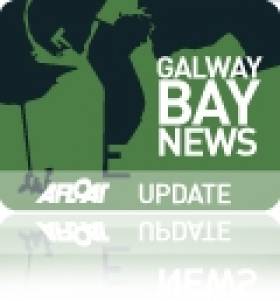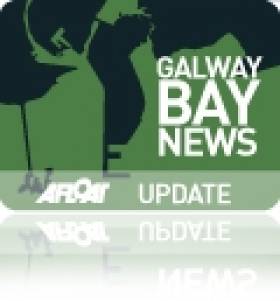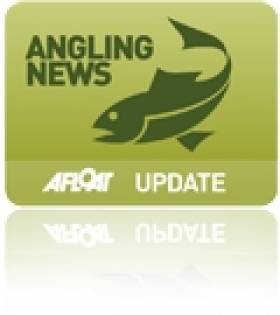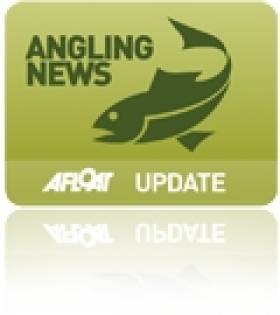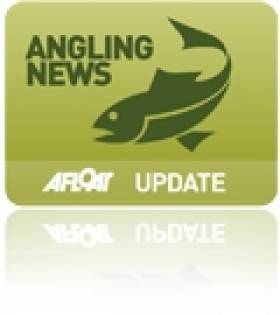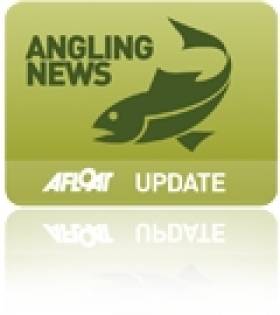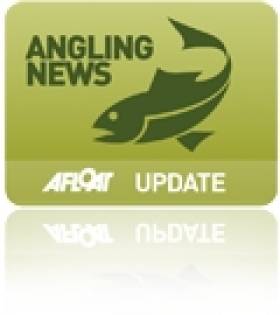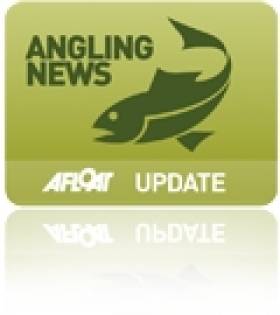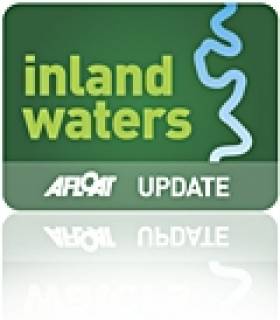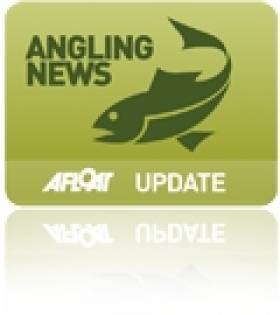Displaying items by tag: Derek Evans
Groups To Protest Marine Minister's Office Over Galway Bay Salmon Farm
#FishFarm - A group opposed to the Galway Bay deep-sea salmon farm proposals has announced it will protest the constituency office of Marine Minister Simon Coveney this Saturday 15 December.
In a statement to the media, No Salmon Farms At Sea (NSFAS) said that it will join likeminded groups Save Bantry Bay, Save Galway Bay, FISSTA and Friends of the Irish Environment, along with other local and national organisations, in a protest march through Carrigaline, Co Cork to Minister Coveney's office in the town, where invited speakers will address the crowd to express their opposition to the fish farm.
As previously reported on Afloat.ie, the 15,000-tonne deep-sea organic salmon farm would be located on a 500-hectare site in Galway Bay off Inis Oirr in the Aran Islands, and would be one of the largest projects of its kind in Europe, projected to be worth more than €100 million annually for the economy, according to Bord Iascaigh Mhara (BIM).
But the proposals have raised the ire of local anglers and conservationists who fear the development could have a negative impact on wild salmon numbers in the area.
"Minister Coveney has been a strong supporter of the aquaculture industry and we intend to let him know that his support is misguided and will result in catastrophe not only for our stocks of wild atlantic salmon and sea trout, but also for the communities and local businesses that depend on their very existence," said NSFAS.
The statement also cited the recent international study involving experts from Inland Fisheries Ireland which concluded that 39% of all young salmon mortalities are directly attributable to sea lice in areas where salmon farming takes place.
It added: "The highly inflated number of jobs, which BIM claim will be created, will be far outweighed by the number of jobs lost in areas where no other industry exists apart from that in tourism...
We have a world class sport fishery here in Ireland and our outwardly projected clean environment is one of our greatest assets. However it is fragile and will be destroyed if the salmon farming industry is developed further.
"Anglers and conservationists will do everything in their power to prevent any further destruction to our environment and already declining wild salmon and sea trout stocks."
Meanwhile, in today's Irish Times, angling correspondent Derek Evans writes that "anglers, stakeholders, hoteliers, restaurateurs, islanders and west coast citizens are 'up in arms' and rallying in large numbers in opposition" to what he describes as "this outrageous proposal".
He also backtracked on his previous claim about the location of the deep-sea farm as "a step in the right direction", explaining that he was contacted by a man living on Inis Oirr who said the location for the new fish farm is just "one land mile" opposite the beach, posing a threat to its tourism assets.
The Irish Times has much more on the story HERE.
Angling Writer 'Deeply Concerned' Over Aran Islands Fish Farm Plans
#GALWAY FISH FARM - In his latest angling column for The Irish Times, Derek Evans writes of his 'deep concern' over the proposed deep sea salmon farm off the Aran Islands in Galway Bay.
Making reference to new research that shows infestations of sea lice - which often concentrate in fish farms - pose a significant threat to the survival of wild salmon fisheries, as previously reported on Afloat.ie, Evans writes that the "untold damage" from such infestations would be "nothing short of catastrophic".
He adds: "While this latest proposal is a step in the right direction in terms of its 'off-shore' location, nevertheless, it will bring a plethora of problems, beginning with the size of its annual output and the 'baggage' that entails if and when it moves into unchartered waters."
Evans also points to the submission on the Environmental Impact Statement (EIS) made by Inland Fisheries Ireland (IFI), which includes "an additional checklist for consideration including the location and dimension of this proposed farm; site characteristics; production process; potential impacts; monitoring; and organic farming", as well as suggesting an assessment of all wild salmon fisheries in the affected area, plus a full monitoring system and baseline study.
Evan's comments come in the wake of IFI's dispute with Bord Iascaigh Mhara over the exclusion from the statutory consultation of a report critical of the proposed salmon farm off Inis Óirr, which has faced opposition from local salmon anglers.
The Irish Times has much more on the story HERE.
DAI Keeping Future of Angling in Ireland Alive
#ANGLING - Irish Times angling correspondent Derek Evans pays tribute to Des Chew of the Dublin Angling Initiative for his work in bringing "the world of angling to thousands of young people who otherwise would be oblivious of Ireland’s rich angling resource".
It's been a particularly busy 2012 for Chew too, writes Evans, overseeing a series of three-day introductory angling courses that have enrolled more than 300 teenagers from around Dublin to date.
And some 60 of them were expected to test their mettle at the annual DAI trout fishing competition in Aughrim, Co Wicklow at the weekend.
The Irish Times has more on the story HERE.
Darndale Fishing Ponds Get New Lease of Life
#ANGLING - The Irish Times' angling columnist Derek Evans revisits the Darndale fishing ponds in north Dublin which have been given a new lease of life thanks to a community-led project to rid the angling spot of an invasive weed.
As reported last November on Afloat.ie, the public fishing ponds were "crying out for help" after an infestation of the invasive curly weed (Lagarosiphon major) which spread throughout the entire expanse of water, making casting virtually impossible.
But thanks to €3,000 in funding from the Heritage Council, the weed was smothered and killed off by jute matting (sackcloth) laid across the two ponds at the facility, restarting them to their former glory.
A 15-strong group including locals, anglers and members of Dublin City Council and Inland Fisheries Ireland spent three days in foul weather pulling out the weed and laying the jute.
The ponds, constructed in 1999 under the Urban Regeneration Programme, are home to good numbers of carp and rude, several of which "splashed and rose to fly-life and appeared to be enjoying their new surroundings" during Evans' visit.
It's hoped that the project will prove to be a success and lead to further works at public angling amenities elsewhere in Dublin, such as Bushy Park.
Grand Canal Bonanza for Wheelchair Anglers
#ANGLING - The Irish Times' angling correspondent Derek Evans was on hand at the Irish Wheelchair Association's eighth annual fishing competition on the banks of the Grand Canal at Lucan recently.
More than 100 anglers from 15 different centres around the country took park in the three-hour event, supported by Inland Fisheries Ireland, Waterways Ireland and Clondalkin-based fishery manager Godfrey Donohue.
The team from Clontarf in north Dublin came out on top after a good afternoon's fishing - perch, pike and trout all showing up to take the bait.
Darren McCabe of the second-placed Navan A team was especially pleased with his performance after a barren 2011 contest, snaring a 500g 'jack' pike, while Navan B team member Brian Melville and Athlone's Pat Feeney both caught wild brown trout.
The Irish Times has more on the story HERE.
#ANGLING - Derek Evans of Howth Sea Angling Club spoke recently to Noel McGuinness on Near FM's Northside2Day about the activities and competitions hosted by the long-established club.
Even those who have never fished before are more than welcome at the club, which provides expert tuition and guidance for novices aside from the weekly boat trips it organises in Dublin Bay and beyond.
Evans also points out the low cost of entry into angling, something that's especially crucial in these lean economic times.
"Angling is a very cheap sport," says the Irish Times angling correspondent. "All you need really is a rod and a reel."
The podcast is available to listen online HERE.
Draft Net Season Won't Be Brought Forward Says Minister
#ANGLING - Minister for Natural Resources Fergus O’Dowd has confirmed that there is no proposal for the extension of the salmon draft netting season.
In response to concerns expressed by the angling community and highlighted by Derek Evans in The Irish Times last week, Minister O’Dowd emphasised that conservation and management of salmon and sea trout is key to protecting our valuable natural resources.
“Recent reports that the commercial season will be extended in certain rivers are untrue and I can confirm that for the 2012 season, the commercial fishing season remains as it was in all areas, with the River Suir still on a reduced season for snap fishing," said the minister.
"I am aware that confusion can arise due to the necessary extent of regulations in place. However, I am not considering any proposal for the extension of the commercial season."
The minister reminded that Inland Fisheries Ireland is the body that enforces Ireland's "extensive" fisheries legislation.
"IFI has offices throughout the country where advice can be sought. There is also a comprehensive and regularly updated website and information is also disseminated on Facebook and Twitter," he said.
Meanwhile, IFI chief executive Dr Ciaran Byrne said that the legislative code is regularly updated to ensure that Ireland's fisheries continue to be protected on the basis of information from IFI’s Standing Scientific Committee and IFI management advice.
“Only rivers with exploitable surpluses are open during the spring season and no fishery is open for commercial exploitation during this time," said Dr Byrne. "Fisheries that are classified catch-and-release or closed for salmon are now protected under bye-law 897 which prohibits the use of worms and the use of any fish hooks other than single barbless hooks.
"IFI’s priorities are maximising the return to Ireland, protecting sustainable jobs in isolated rural communities and promoting our wonderful angling resources," he added.
#ANGLING - Plans to bring forward the estuary draft net season "would have a detrimental effect" on spring salmon stocks, writes Derek Evans in The Irish Times today.
Evans was responding to proposals before Minister of State for Natural Resources Fergus O'Dowd to extend the draft net season from its current start date of 12 May to mid-April.
"At a time when we are beginning to see the benefits of the 2006 drift net closure coming to fruition in terms of salmon returning to our lakes and rivers," he writes, "is it not absolutely unreasonable to even consider such an application?"
He referred to anglers who have "played their part" by sticking to a "suite of regulations" introduced by the State in an effort to conserve river stocks, which include a doubling of the salmon licence fee and an annual bag limit restricted to 10 fish.
Spring salmon angling is also a significant attraction for tourism, he suggests, and any threat could damage that business.
The minister's office has issued a statement saying there no proposal currently under consideration to bring forward the start date.
Fond Memories of Guinness Barges on the Liffey
#INLAND WATERWAYS - As Derek Evans writes in The Irish Times, the recent discovery of the first Guinness merchant vessel - sunk a century ago by a German torpedo in the Irish Sea - rekindled memories of the brewery's boats on the Liffey in the 1950s.
He writes: "Living close to Stoneybatter, I often took time to stand on Queen Street Bridge as the barges, filled with Guinness barrels, slowly made their way from James’s Gate to Sir John Rogerson’s Quay.
"I remember clearly the skipper standing beside the open wheelhouse in his navy blue polo-neck jumper, captain’s hat and pipe... The skipper always had a smile and a wave before he would disappear for a few moments under the white cloud."
He also recalls the hoisting of the barrells at Butt Bridge onto the Guinness cargo vessels - like the WM Barkley, the Lady Grania or Gwendolen Guinness - for transport to Liverpool.
As previously reported on Afloat.ie, the wreck of the WM Barkley was captured in high-resolution images taken from the national research vessel RV Celtic Voyager off the coast of Dublin.
The Irish Times has more on the story HERE.
Bumper Catch at Rock House Fishery
Described by The Irish Times' Derek Evans as "one of the Great Fishing Houses of Ireland", the Rock House fishery in Co Mayo boasted banner numbers of salmon and sea trout catches this spring and summer.
April started off strong on the Owenduff River in Ballycroy, with three spring salmon weighing between 9.5lb and 12lb landed in the first two weeks.
This was followed by respectable numbers in May of 30 salmon and three sea trout. But June and July were the bumper time for angling, with thundery rain aiding the catch.
Even August proved bountiful despite lacking in fresh grilse, with 12 salmon ad 27 sea trout caught throughout the month.
"Drift netting laws appear to be having a positive effect," said Rock House's Sibylle Geffroy.
The Irish Times has more on the story HERE.



























